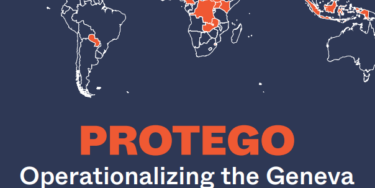Universal Rights Group
Authors: Marc Limon (URG), Nazila Ghanea (University of Oxford), Hilary Power (URG)
It is almost impossible to turn on the news today without witnessing scenes of hatred, violence and intolerance perpetrated in the name of religion or belief. The march of ISIL across Syria and Iraq, with associated reports of gross and systematic violations of human rights, may be an extreme example of such hatred, but it comes against a background of heightened religious hostility and discrimination in virtually every part of the world.
According to a recent report by the Pew Research Center, violence and discrimination against religious groups by governments and rival faiths have reached new heights in all regions except the Americas. This bleak picture is supported by the findings of the latest report on religious freedom by the US State Department, which concluded that 2013 saw ‘the largest displacement of religious communities in recent memory,’ with millions of individuals from all faiths ‘forced from their homes on account of their religious beliefs’ in ‘almost every corner of the globe.’
In the face of such trends, it is clear that the fight against religious intolerance and discrimination must be a key political priority for the international community, and in particular the UN and its Human Rights Council.The main UN global policy framework for combatting intolerance, stigmatisation, discrimination, incitement to violence and violence against persons based on religion or belief is set down in Council resolution 16/18.
Resolution 16/18 was adopted, with much fanfare, in March 2011 and hailed by stakeholders from all regions and faiths as a turning point in international efforts to confront religious intolerance. After more than five decades of failure, UN member states had, it was hoped, at last come together to agree a common, consensus-based approach and practical plan of action. Almost four years on, and against the aforementioned backdrop of heightened religious hostility, UN consensus around the ‘16/18 framework’ is at breaking point. Rather than working together to implement the 16/18 action plan, states have returned to pre-2011 arguments over the nature of the problem, the correct role of the international community, and whether the solution to intolerance lies in strengthening the enjoyment of fundamental human rights or in setting clearer limits thereon.
These divisions have re-emerged, in large part, because of conceptual confusion among policymakers about what implementation of resolution 16/18 means and what it entails. Linked to (and indeed flowing from) this conceptual opacity, states – especially states from the Western Group (WEOG) and the Organisation of Islamic Cooperation (OIC) – argue over whether resolution 16/18 is being effectively implemented or not and, if not, who is to blame.
The present policy report aims to help put the 16/18 framework ‘back on track’ by cutting through the political rhetoric to understand the different positions of key actors and how to bridge them, and by providing an impartial assessment of levels of implementation.The report ends by proposing a set of recommendations designed to ‘re-energise’ the 16/18 process and thereby strengthen the international community’s ability to effectively respond to rising intolerance and discrimination.
Download PDF


